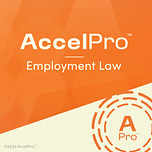Welcome to AccelPro Employment Law, where we provide expert interviews and coaching to accelerate your professional development.
Today we’re going to talk about our country’s at-will employment regime and how it favors employers over employees. Our guest is Cynthia Estlund. She is a leading and wide ranging scholar of labor and employment law and workplace governance.
Currently a professor at NYU’s Law School, she has also taught at Harvard, Columbia and the University of Texas. We dove so deep on this issue that we turned it into two episodes. This is part one, in which we break down what at-will employment means for employees and employers and the ever-present power struggle between them. Be sure to check out part two, in which we explore ways to rebalance that imbalance of power and search for possible solutions. The supplemental materials and episode transcript are available below.
AccelPro’s expert interviews and coaching accelerate your professional development. Join AccelPro Employment Law now for a free trial of everything we offer to members.
Interview References:
Cynthia Estlund’s NYU Law faculty page
2:56 | National Labor Relations Act (NLRA), 29 U.S.C. §§ 151-169 (1935). National Labor Relations Board.
3:09 | Title VII of the Civil Rights Act of 1964, § 7, 42 U.S.C. § 2000e et seq (1964). US Equal Employment Opportunity Commission.
3:38 | Enforcement Guidance on Retaliation and Related Issues. US Equal Employment Opportunity Commission.
13:13 | Estlund, Cynthia. (2022). Wrongful Discharge Law in the Land of Employment-at-will: A US Perspective on Unjust Dismissal. King’s Law Journal, 33(2).
16:50 | Listen to a prior AccelPro Employment Law episode on Starbucks and the Changing Labor Landscape.
TRANSCRIPT
I. AT-WILL REGIME
Matt Crossman, Host: You’ve written on such a wide variety of employment law issues. You told me that one issue—the at-will employment regime—stands atop all of them. It’s the one issue that runs through almost all of employment law. Everybody has to deal with it—employers, lawyers and regulators. Let’s start by defining the term and why it’s so important.
Cynthia Estlund: So employment at-will started out as a truly draconian rule from an employee standpoint, meaning employers were allowed to fire people for any reason, good reason, no reason, bad reason, any reason at all.
And indeed, for the first part of the 20th century and before, legislatures couldn’t limit that. They couldn’t prohibit employers from firing people for reasons that the legislature concluded were bad or socially destructive.
Nowadays, we all know that there are some reasons for which you can’t fire people, right? The first huge exception was for the National Labor Relations Act, passed in the New Deal, 1935, which said you can’t fire people for engaging in union activity. There was kind of a pause for a while and then the Civil Rights Act of 1964—which created huge exceptions to employment at-will.
You can’t fire or refuse to hire or promote individuals based on race, color, religion, national origin or sex. Those templates each generated a bunch of additional exceptions to employment at-will. There’s the anti-retaliation exceptions. There’s activities that we want to protect as a society, and so you can’t fire people for those reasons.
There’s status, identity, aspects of traits that you can’t change or that are intimate to your identity that are protected against discrimination. All of those though, operate against the background of employment at-will. You can fire people for any reason, no reason, good reason. You could still fire people for bad reasons if it’s not one of the bad reasons that in your jurisdiction is unlawful.
MC: Employees can be fired without notice at any time and without reason. I hear that and I think if I work in human resources or as in-house counsel, I think, wait, we can fire anybody at any time for no reason?
CE: A company that’s concerned about its reputation (won’t do that). First of all, you don’t want to fire people for any of those bad reasons.
How do you avoid doing that? The decisions are made by somebody down the hierarchy. You probably want to, and you will already have set up a review process. And you might act as if you have to justify dismissal. You don’t actually have to justify it, but that might be the right way to run your operation if you are concerned about getting sued, because if you get sued, it’s going to be a factual dispute over whether you had the bad motive that the employee’s complaining about or any other motive that could be defensible.
Employment at-will doesn’t describe the actual legal environment anymore. But the fact is if you claim you were fired because you wanted to join a union you would have the right to file a complaint.
The National Labor Relations Board might decide to process that, in which case they would have to prove that was the reason you were fired. All of the wrongful discharge exceptions, which we can call them, are based on proof of motive, and unless you prove the bad motive, we are back to the background presumption of employment at-will.
Just to underscore, what would the alternative be? What virtually every other developed country in the world has, which is some kind of unjust dismissal regime by which the employer has to justify dismissal or else pay you some kind of remedy.
MC: Is there a challenge there that once you set a policy, you frankly run the risk of violating it yourself?
Listen to this episode with a 7-day free trial
Subscribe to AccelPro | Employment & Labor Law to listen to this post and get 7 days of free access to the full post archives.












